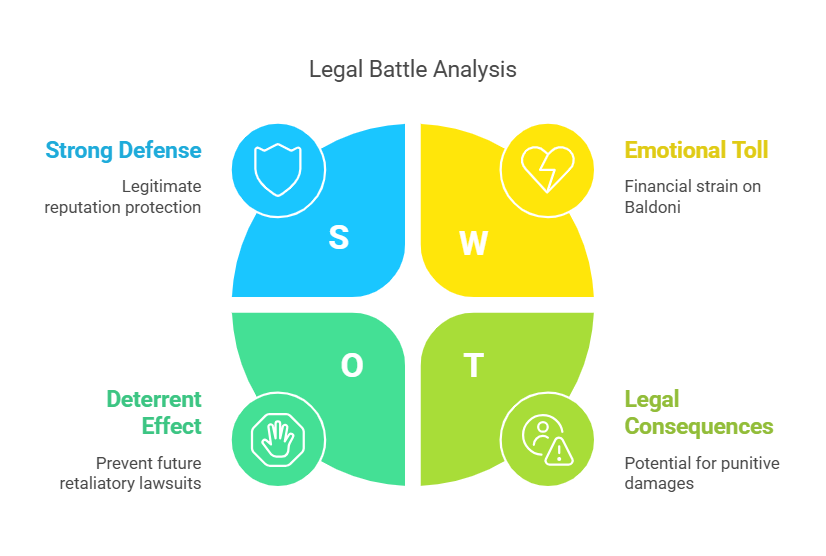In a significant legal development, actress Blake Lively has filed a motion to dismiss a $400 million defamation lawsuit initiated by her “It Ends With Us” co-star and director, Justin Baldoni. Lively’s legal team characterizes the lawsuit as a “vengeful” attempt to misuse the judicial system, following her allegations of sexual harassment against Baldoni during the film’s production. Central to Lively’s defense is California’s Assembly Bill 933 (AB 933), which offers protections to individuals reporting sexual misconduct.
Background of the Dispute
The legal conflict traces back to December 2024, when Lively accused Baldoni of creating a hostile work environment on the set of “It Ends With Us.” Her allegations included inappropriate sexual comments and unsolicited physical advances. In response, Baldoni filed a countersuit in January 2025, alleging defamation, extortion, and invasion of privacy against Lively, her husband Ryan Reynolds, and their publicist Leslie Sloan. Baldoni’s lawsuit contends that Lively orchestrated a smear campaign to tarnish his reputation and gain creative control over the film.
Lively’s Motion to Dismiss
On March 20, 2025, Lively’s attorneys filed a motion in the U.S. District Court for the Southern District of New York, seeking dismissal of Baldoni’s defamation lawsuit. They argue that the lawsuit is a retaliatory measure intended to silence Lively for speaking out about her experiences of sexual harassment. The motion emphasizes that such retaliatory actions are prohibited under California law, specifically referencing AB 933.
California’s Assembly Bill 933
Enacted in October 2023, AB 933 extends legal protections to individuals who report incidents of sexual assault, harassment, or discrimination. The law classifies such communications as privileged, shielding them from defamation lawsuits, provided they are made without malice and are based on credible evidence. Lively’s legal team asserts that her allegations against Baldoni fall under this protected category, rendering his defamation claims invalid.
Statements from Lively’s Legal Team
In their motion, Lively’s attorneys, Michael Gottlieb and Esra Hudson, described Baldoni’s lawsuit as a “profound abuse of the legal process.” They argue that the lawsuit aims to intimidate and financially burden Lively for her decision to come forward with her allegations. The attorneys further contend that Baldoni’s actions are part of a broader campaign to discredit Lively and deter others from speaking out against sexual misconduct.
Potential Consequences for Baldoni
If the court grants Lively’s motion to dismiss under AB 933, Baldoni and his co-defendants could be held responsible for covering Lively’s legal expenses. Additionally, they may face treble (triple) and punitive damages for initiating what Lively’s attorneys describe as a “meritless and retaliatory” lawsuit. This outcome would serve as a deterrent against similar retaliatory legal actions in the future.
Baldoni’s attorney, Bryan Freedman, responded to Lively’s motion by labeling it as “one of the most abhorrent examples of abusing our legal system.” Freedman asserts that Baldoni has been financially and emotionally devastated by the legal confrontation and emphasizes the need to hold Lively accountable for her actions. He maintains that Baldoni’s lawsuit is a legitimate effort to defend his reputation against unfounded allegations.
Impact on “It Ends With Us”
The legal battle has shadowed “It Ends With Us,” the film adaptation of Colleen Hoover’s bestselling novel. The controversy has affected promotional activities and public reception of the film. Hoover initially expressed support for Lively but has since refrained from commenting further on the legal disputes. The film’s release has been marred by the ongoing litigation, impacting its box office performance and critical reception.
The allegations and subsequent lawsuits have elicited strong reactions within the entertainment industry. The Screen Actors Guild‐American Federation of Television and Radio Artists (SAG-AFTRA) expressed support for Lively, emphasizing the importance of addressing sexual harassment in the wworkplace. Conversely, some industry insiders caution against the potential misuse of legal protections to shield individuals from legitimate defamation claims. The case has sparked discussions about the balance between protecting survivors and ensuring due process for the accused.
Upcoming Legal Proceedings
The case is scheduled for trial on March 9, 2026. In the interim, the court will review Lively’s motion to dismiss Baldoni’s countersuit under AB 933. Legal experts suggest that the outcome of this motion could set a significant precedent regarding the application of AB 933 in protecting individuals who speak out about sexual misconduct from retaliatory defamation lawsuits. The court’s decision may influence how future cases involving similar circumstances are handled, potentially shaping the legal landscape for survivors of sexual misconduct.
The legal dispute between Blake Lively and Justin Baldoni underscores the complexities involved in addressing allegations of sexual misconduct within the entertainment industry. As the case unfolds, it highlights the challenges individuals face when coming forward with such allegations and the potential legal repercussions they may encounter. The invocation of AB 933 in this context serves as a critical test of the law’s effectiveness in protecting individuals from retaliatory legal actions, potentially setting a precedent for future cases.
The information is collected from Variety and Yahoo.




































